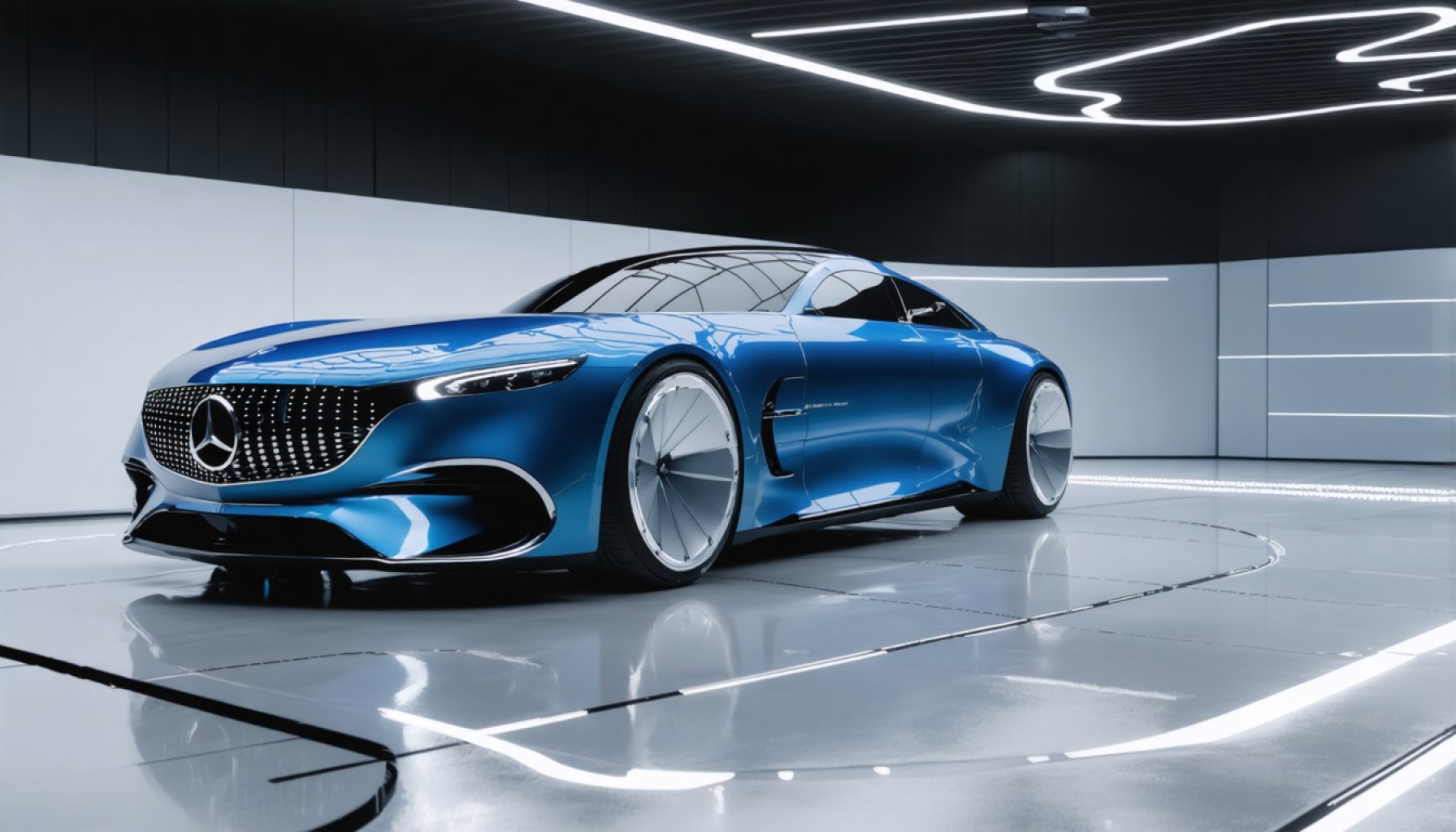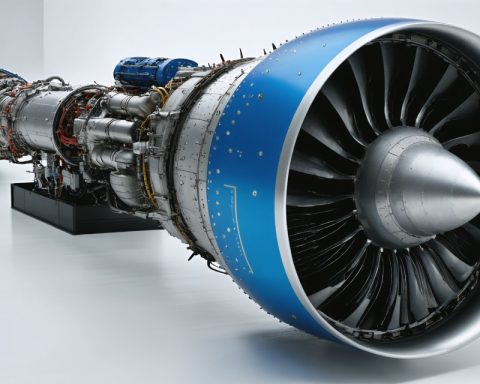- Mercedes-Benz is testing a solid-state battery prototype in a reimagined EQS sedan, promising a range of over 620 miles on a single charge.
- Collaborating with Factorial Energy and experts from Germany, the U.K., and the U.S., they are developing a lithium-metal battery using innovative dry cathode pouch cells.
- Formula 1 technology is utilized by Mercedes-Benz engineers to create pneumatic actuators that enhance the battery’s stability and longevity by managing expansion and contraction during charge cycles.
- Mercedes-Benz forecasts a 25% range increase compared to similar lithium-ion systems, with potential future energy densities reaching up to 450Wh/kg.
- The introduction of silicon carbide inverters and advanced power electronics signifies a leap in energy efficiency and performance, setting the stage for future vehicle designs.
- This initiative positions Mercedes-Benz as a key player in shaping the future of electric mobility.
A daring new chapter unfolds in the story of electric mobility. Mercedes-Benz ignites anticipation with the test launch of its solid-state battery prototype in a reimagined EQS sedan. Imagine cruising over 620 miles on a single charge—this tantalizing range projection peers into the future of driving without frequent recharge stops.
Picture a team of visionary engineers across three continents pooling their expertise. At the heart of this innovation, Mercedes-Benz collaborates with Factorial Energy and automotive powerhouses in Germany, the U.K., and the U.S. Their joint creation, a lithium-metal battery, and its promising capabilities are currently under rigorous evaluation. The EQS’s battery compartment now cradles Factorial Energy’s pioneering dry cathode pouch cells—a departure from the conventional lithium-ion batteries powering today’s models.
In this audacious experiment, cutting-edge ingenuity sees Formula 1 technology joinging the fold. Mercedes-Benz’s engineers in the U.K. crafted pneumatic actuators to deftly handle the battery cell’s expansion and contraction during charge cycles. This results in unparalleled stability and longevity.
Though full technical details remain under wraps, Mercedes-Benz promises a 25% boost in range compared to similar-sized lithium-ion systems. The horizon glitters with the promise that these solid-state batteries, internally code-named “Solstice,” could increase energy density up to 450Wh/kg, suggesting an 80% leap in range over today’s norm.
Driving this ambitious journey further, Mercedes-Benz fuses silicon carbide inverters with cutting-edge power electronics. As the EQS prototype paves the road, it heralds a new era of energy efficiency and performance, hinting at a sleek new silhouette for future models.
In this narrative of innovation, Mercedes-Benz doesn’t just test technology; it shapes the future lane by lane, stride by stride.
Game-Changer in Electric Mobility: How Mercedes-Benz Leads with Solid-State Battery Innovation
How-To Steps & Life Hacks: Maximizing Solid-State Battery Efficiency
1. Stay Informed: If you’re considering an electric vehicle (EV) upgrade, monitor advancements in solid-state battery technology. Familiarize yourself with the changing EV landscape by following updates from manufacturers like Mercedes-Benz.
2. Optimize Charging Habits: Once solid-state batteries become mainstream, adopt best charging practices. Avoid extreme temperature exposure, and employ the manufacturer’s recommended charging settings to extend battery life.
3. Leverage Smart Charging Solutions: Use smart chargers to schedule charges during off-peak hours, reducing costs and optimizing grid use.
Real-World Use Cases: Solid-State Batteries in Action
Solid-state batteries promise significant improvements across various applications:
– Long-Distance Travel: With a potential range of over 620 miles, EVs equipped with solid-state batteries could become viable solutions for cross-country travel without frequent stops.
– Commercial Transport: Industries requiring reliable logistics without excessive downtime could benefit, reducing operating costs and increasing operational efficiency.
Market Forecasts & Industry Trends
The global solid-state battery market is expected to grow significantly. According to a report by MarketWatch, this market could reach billions by the next decade, driven by automotive giants and burgeoning consumer electronics demand. Mercedes-Benz’s pioneering ventures signal increasing investment and innovation in this battery technology space, a likely trend in the years ahead.
Reviews & Comparisons: Solid-State vs. Lithium-Ion
While lithium-ion batteries dominate currently, the shift towards solid-state comes with pros and cons:
– Advantages: Increased energy density, faster charging times, and improved safety due to less volatile materials.
– Challenges: Production scalability and high initial costs remain hurdles that manufacturers are striving to overcome.
Controversies & Limitations
Solid-state battery technology isn’t without its drawbacks:
– Manufacturing Challenges: These include high production costs and the complexity of material synthesis, affecting scalability and widespread adoption.
– Cycle Life: Questions remain about the long-term durability of newer solid-state configurations compared to proven lithium-ion solutions.
Features, Specs & Pricing
While Mercedes-Benz has not disclosed explicit specs, the emphasis is on:
– Energy Density: Estimated at 450Wh/kg for solid-state versus 250Wh/kg for typical lithium-ion cells.
– Provisional Range: A projected 620 miles per charge highlights substantial advancements.
Pricing will be a dynamic factor depending on the progress in production efficiency and economies of scale.
Security & Sustainability
Solid-state batteries offer enhanced safety due to their reduced flammability. They are also potentially more environmentally friendly, aligning with sustainable initiatives, particularly if they lower reliance on heavy metals in production.
Insights & Predictions
Solid-state batteries could revolutionize electric mobility and the broader energy landscape by:
– Enhancing EV Competitiveness: Closing the gap between EVs and traditional vehicles in terms of range and refueling convenience.
– Shaping Automotive Design: Enabling lighter and more aerodynamically optimized vehicle designs.
Tutorials & Compatibility
Future tutorials will likely focus on integration and repair knowledge, supplementing existing EV maintenance skills. Compatibility with existing EV infrastructure remains to be seen but promises wide-ranging updates.
Pros & Cons Overview
Pros:
– Extended Range
– Enhanced Safety
– Faster Charging
Cons:
– High Production Costs
– Current Scalability Issues
Actionable Recommendations
– For Consumers: If you’re in the market for an EV, keep an eye on upcoming models featuring solid-state batteries for a potentially transformative ownership experience.
– For Investors: Consider opportunities in companies advancing battery technology, as long-term market growth appears promising.
– For Industry Professionals: Stay updated with innovations in battery technology to remain competitive in the changing landscape.
For more information, visit the official Mercedes-Benz website.
By understanding these advances and following market trends, stakeholders can position themselves advantageously in the evolving electric mobility space.








